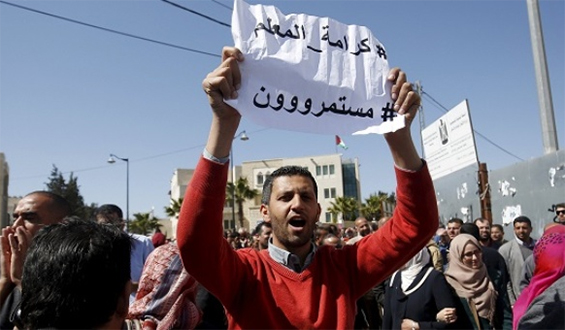
All the public schools in Palestine have been closed since the beginning of February, following an unprecedented teachers strike against the government. Recent teachers’ demand for wage increases have spiraled into the largest protests in the West Bank in years.
In February, over 20,000 teachers marched in Ramallah seeking higher salaries as previously promised to them by the Palestinian Authority in a 2013 agreement that was never implemented, writes Palestine News Network. In addition to the pay raises, the agreement also included free tuition at state universities for the children of teachers.
Last week, over 3,000 educators rallied outside the Prime Minister’s office asking for new representation in the negotiation group between the teachers and the government. The teachers also confirmed they were determined to continue with the protests until their requirements are met. More than one million Palestinian children and their families have been affected by the teachers strike.
At the same time, the Palestinian government is facing financial difficulties and replied with threats for arrests and massive job cuts. The government officials have disagreed to talk to the teachers’ representatives and insisted they come back to work as soon as possible. As the Middle East Eye reports, the Teachers’ Union has been accused of attempting to sabotage the strike by accepting the settlements without the explicit agreement of teachers.
Many educators have been arrested and questioned by the police before being released. The head of the union, Ahmed Suheil, suspected the strike was a Hamas-led scheme to take over the West Bank.
In an official press release, Prime Minister Rami Hamdallah said that teachers have the right to express their opinion openly as a part of the democratic process. He also added:
“The Palestinian teacher deserves our respect and admiration. However, everyone should put the interest of our children and their education ahead of everything.”
However, according to the correspondents for Albawaba News, the Palestinian Authority set up checkpoints to prevent the teachers from reaching the protests. Islamic clerics also used mosque loudspeakers to ask teachers to go back to school.
Although most of the parents support the teachers, many of them are worried that their teenagers are losing precious time to prepare for university entrance exams in the spring. Others are concerned that the classes will be extended into the holy month of Ramadan in June when fasting children will not be able to concentrate on lessons.
Ehab Al-Jariri, a Palestinian radio commentator, said the government was concerned that compromising with educators could result in other labor strikes. The government’s plan, he said, was to drag out the protests while hoping that teachers would be pushed by public opinion to go back to work. Instead, it led to what government was most afraid of – structured opposition.
In an interview with Diaa Hadid and Rami Nazzal of The New York Times, Nathan Thrall, a senior analyst at the International Crisis Group, commented that the protests clearly showed the “huge discontent” among Palestinians toward the political situation in Palestine. According to Thrall, it reflects the frustration that there are no signs of progress on statehood or to an end to Israel’s occupation of the West Bank. Palestinians are also frustrated because of the lack of democracy and a functioning legislature, added Thrall.




